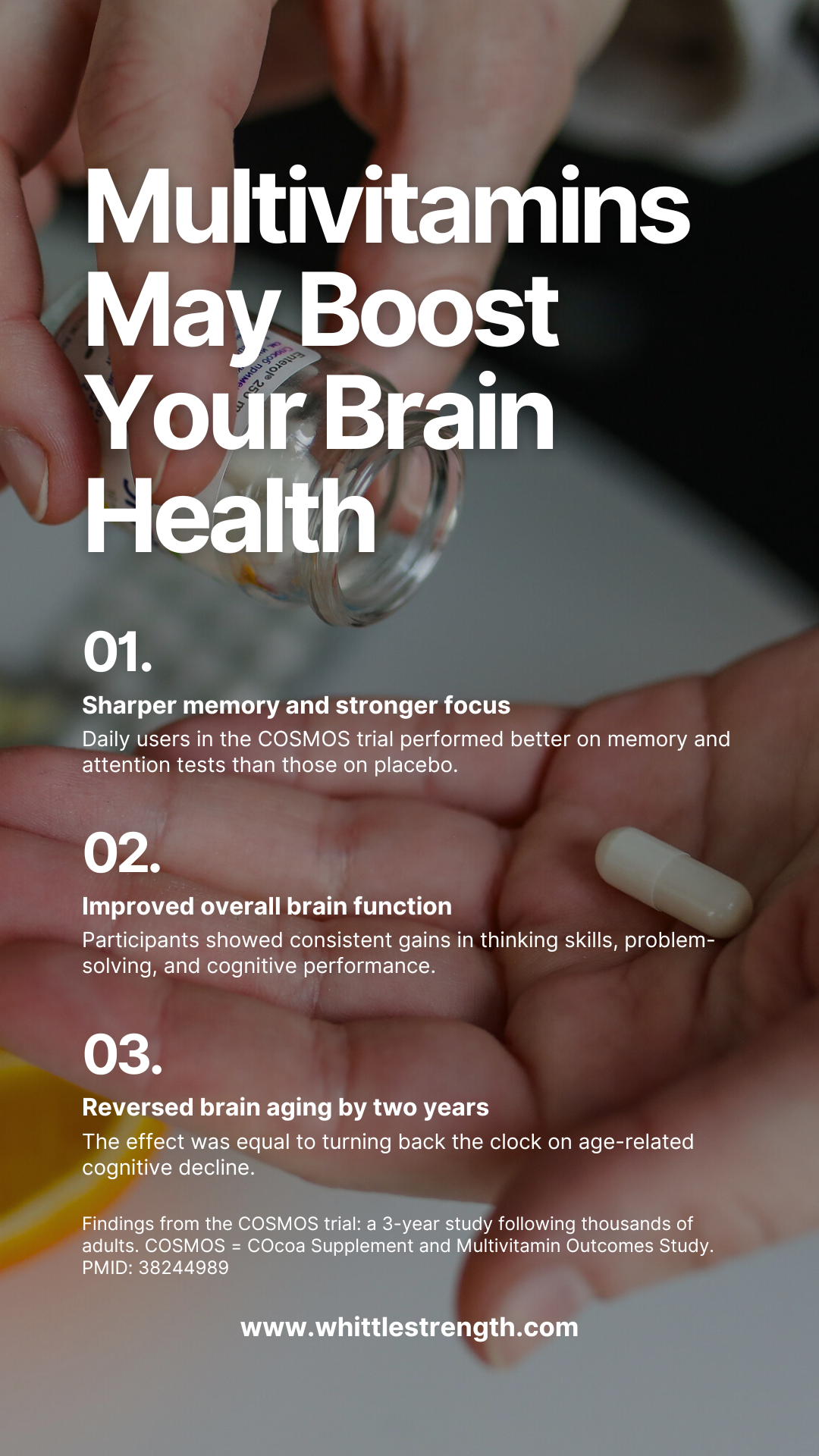Should You Take a Multivitamin? What the Science Really Says
The Problem: Nutrient Gaps Are Everywhere
If you think you’re hitting all your nutrient needs through food alone, the numbers say otherwise.
Roughly 70% of Americans are low in vitamin D
Nearly half don’t get enough magnesium
A third fall short on calcium
These are not small misses. Low vitamin D is linked to higher mortality. A lack of magnesium speeds up aging. Folate deficiency damages DNA at levels similar to radiation exposure.
Food should be our primary source of nutrients, but it’s hard to get everything right every day. You’d need a diet that’s perfectly balanced, perfectly consistent, and perfectly portioned. Most of us don’t eat that way. That’s where the appeal of a multivitamin comes in. It promises to cover the gaps.
The Big Debate: Miracle Pill or Expensive Urine?
Multivitamins are one of the most widely used supplements in the world. Roughly a third of adults report taking one. But ask people what they think about them, and you’ll get two very different answers.
Some say it’s cheap nutritional insurance. Others say you’re just making your pee more expensive.
That second opinion has become a bit of a cultural joke, but it leaves us with a real question: if multivitamins don’t prevent disease or extend life, are they worth it?
The Clear Evidence: Multivitamins Support Brain Health
This is where the science gets interesting. The COSMOS trial, short for the COcoa Supplement and Multivitamin Outcomes Study, is one of the largest and most rigorous studies ever done on multivitamins. Researchers followed thousands of adults for three years to see if a daily multivitamin could make a measurable difference.
And it did.
Participants who took a daily multivitamin performed better on tests of memory, focus, and executive function compared to those who took a placebo. These weren’t one-off results. Across three separate COSMOS sub-studies, the benefits showed up again and again.
A meta-analysis that combined the data confirmed what researchers suspected: daily multivitamins really do improve brain health. The gains were equal to turning back the clock on brain aging by about two years.
For anyone who’s worried about staying sharp as they get older, or simply wants to protect brain function long-term, that’s a meaningful benefit.
What About Living Longer?
Of course, most people don’t start taking a multivitamin because they’re worried about brain aging. They start because they hope it might prevent disease or add a few years to their life. On that front, the evidence isn’t nearly as strong.
A 2024 study published in JAMA pulled data from nearly 400,000 people. Researchers wanted to see if taking a multivitamin was linked to a lower risk of death from all causes, including heart disease and cancer.
Here’s what they found:
People who took a multivitamin daily had a slightly higher mortality risk in the first 12 years, about 4%
Those who took them less often had a 9% increase
After 15 years, those differences disappeared completely
When you look closer, the numbers are so small they’re essentially no difference at all. The hazard ratio, the measure scientists use to compare risk, was 1.04 for daily users, where 1.00 means no difference.
In plain language, multivitamins don’t seem to extend life. But they don’t shorten it either.
The Real Role of a Multivitamin
So where does that leave us? If multivitamins don’t extend life, does that mean they’re useless? No. It just means they were never meant to be miracle pills. They can’t replace a healthy diet. They won’t stop you from getting cancer. They won’t add decades to your lifespan.
What they can do is cover the small but important gaps that most of us have in our diet. And thanks to COSMOS, we now know that those small gaps, when filled, translate into meaningful benefits for the brain.
That’s why the best way to think about a multivitamin is as nutritional insurance. You don’t buy car insurance because you expect to crash every time you drive. You buy it because the downside of not having it is too big to risk. A multivitamin works the same way.
Bottom Line
If your diet is flawless, your bloodwork is perfect, and you live on leafy greens, you probably don’t need a multivitamin. But for the rest of us, the people who skip meals, eat on the run, or simply don’t want to track every nutrient every day, a multivitamin is a simple and affordable way to backstop your health.
It’s not glamorous. It won’t transform your life overnight. But it will quietly fill in the blanks your diet leaves behind. And based on the best evidence we have, it might even keep your brain a little sharper and a little younger along the way.
Source and Further Reading
Loftfield E, O’Connell CP, Abnet CC, et al. Multivitamin Use and Mortality Risk in 3 Prospective US Cohorts. JAMA Netw Open. 2024;7(6):e2418729. doi:10.1001/jamanetworkopen.2024.18729
Vyas CM, Manson JE, Sesso HD, Cook NR, Rist PM, Weinberg A, Moorthy MV, Baker LD, Espeland MA, Yeung LK, Brickman AM, Okereke OI. Effect of multivitamin-mineral supplementation versus placebo on cognitive function: results from the clinic subcohort of the COcoa Supplement and Multivitamin Outcomes Study (COSMOS) randomized clinical trial and meta-analysis of 3 cognitive studies within COSMOS. Am J Clin Nutr. 2024 Mar;119(3):692-701. doi: 10.1016/j.ajcnut.2023.12.011. Epub 2024 Jan 18. PMID: 38244989; PMCID: PMC11103094.
BUY OUR RECOMMENDED BRAND FOR MULTIVITAMIN
Share this post:


